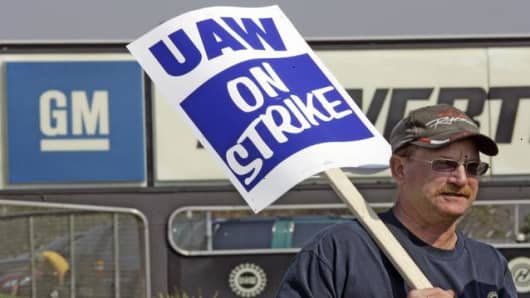Thousands of United Auto Workers walked off the job at General Motors plant around the country on Monday in the first nationwide strike during auto contract negotiations since 1976.
United Auto Workers President Ron Gettelfinger said Monday that the union has no intention of suspending a national strike against GM until it reaches a deal with the automaker.
According to Gettelfinger, the union launched the strike after "one-sided negotiations" failed to reach an agreement.
"The company walked right up to the deadline like they really didn't care," he said during a press conference that was broadcast live on CNBC.com.
"We will be going back to the bargaining table today," he said. "However, in the frame of mind we are in now, we would expect that the company would move rather expeditiously on the open issues that are in front of us."
According to Gettelfinger, the talks broke down over issues related to active workers, including job security, investment in U.S. plants, wages, benefits and job creation.
General Motors shares closed 0.57% lower at $34.74.
Workers began picketing outside the GM plants shortly after the deadline of 11 a.m. New York time Monday had passed.
The UAW has 73,000 members who work for GM at 82 U.S. facilities, including assembly and parts plants and warehouses.
It remained to be seen what effect the strike would have on the automaker and consumers. The company has sufficient stocks of just about every product to withstand a short strike, according to CNBC's Phil Lebeau.
According to Lebeau, the strike will immediately result lost production of about 12,200 vehicles per day in the U.S. If the strike continues, the shut down will begin to trickle into other parts of the GM system, resulting in lost production overseas, he said.
Lebeau expects that after 36 hours, the company will begin to lose production of 16,200 vehicles per day. After 72 hours, that number will rise to 18,100 vehicles per day, he said, citing figures from CSM Worldwide.
A worker at a GM powertrain plant in Warren, Mich., who was interviewed by LeBeau said he was committed to staying on strike until a deal can be reached with GM management.
The UAW had extended its contract for nine days after it expired on Sept. 14, but the negotiations became bogged down Sunday. Despite, the impasse, the negotiations continued through the night.
"We are disappointed in the UAW's decision to call a national strike," GM said in a statement. "The bargaining involves complex, difficult issues that affect the job security of our U.S. work force and the long-term viability of the company. We are fully committed to working with the UAW to develop solutions together to address the competitive challenges facing General Motors."
GM had been pushing hard in the negotiations for the health care trust - known as a Voluntary Employees Beneficiary Association, or VEBA - so it could move $51 billion in unfunded retiree health costs off its books. GM has nearly 339,000 retirees and surviving spouses.
"This strike is not about the VEBA in any way shape or form," Gettelfinger said during the press conference. "The No. 1 issue here is job security," he said.
Separately, the Teamsters Union said they will honor the UAW strike by not hauling any GM-made vehicles made by the automaker.
"Workers should not solely bear the brunt of decades of bad business decisions by GM management," Teamsters President James Hoffa said in a statement.


